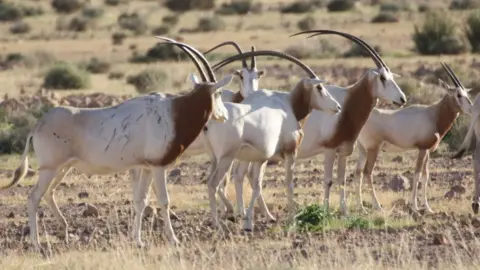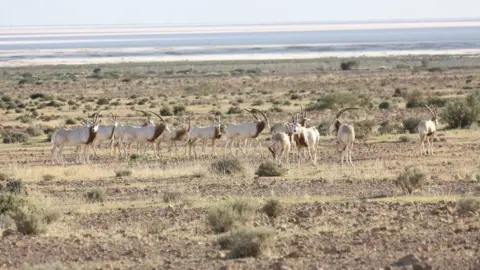Marwell zoo helps brings rare antelope back from brink of extinction
 PA Media
PA MediaA rare antelope has been brought back from the brink of extinction with the help of a zoo in Hampshire.
The scimitar-horned onyx was declared extinct in the wild in 2000 but has now been down-listed to endangered.
The change is a result of conservation efforts across the world, including from the team at Marwell.
The zoo, near Winchester, was involved in setting up a self-sustaining population of the antelope in Africa.
The International Union for Conservation of Nature Red List changed the status of the animal after 600 of them were introduced to the Ouadi Rime-Ouadi Achim Faunal Reserve in Chad, Africa.
Marwell helped by providing oryx for the new population and was also part of the team which modelled the release strategy.
Dr Tania Gilbert, head of conservation science at Marwell Wildlife, said: "The change in status... is a testament to the power of collaborative conservation action, and gives us all hope that we are able to make a real difference and restore nature.
"The species is still at risk from extinction, but the conservation work in Chad, Tunisia, Morocco and Senegal, greatly reduces this risk and has given the species a real chance of recovery."
 PA Media
PA MediaMarwell Wildlife, which manages the World Association of Zoos and Aquariums (Waza) International Studbook for scimitar-horned oryx, was also awarded the Waza Conservation Award 2023 for its conservation work re-establishing the animals back in their habitats in Tunisia.
A spokeswoman said: "Marwell has worked with the species since the zoo opened in 1972 and, along with Edinburgh Zoo, donated the first group of oryx to the pioneering reintroduction programme to Bou Hedma National Park in Tunisia in 1985.
"Since then, Marwell has co-managed reintroduction projects to a further three protected areas in Tunisia."
Professor Philip Riordan, director of conservation, added: "We believe that humanity can correct its past mistakes, and modern zoos and aquaria are perfectly placed to lead these conservation efforts."

Follow BBC South on Facebook, X, or Instagram. Send your story ideas to [email protected].
